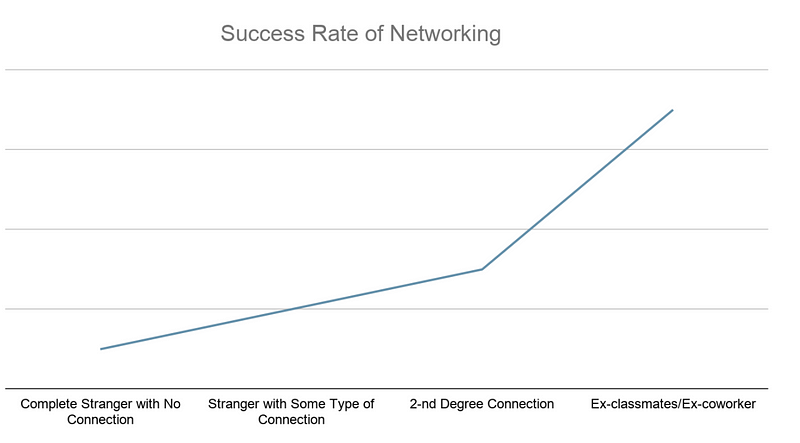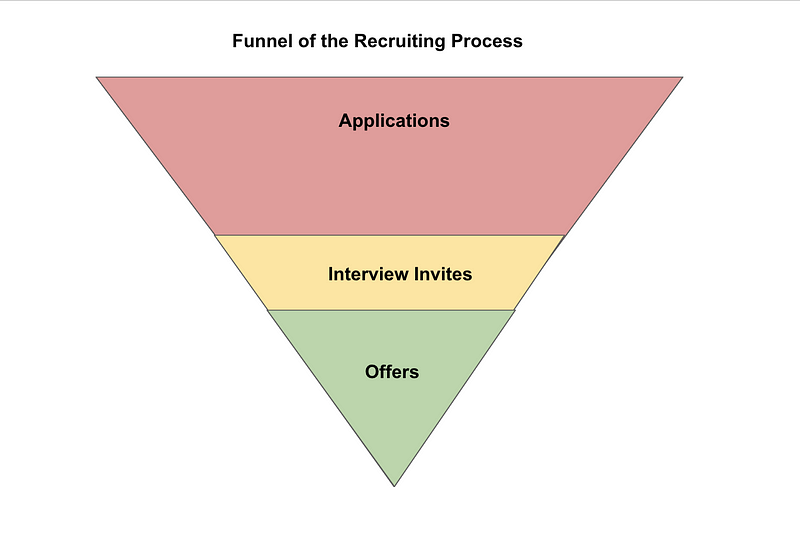Application and Resume Tricks to Land Your Dream Job in the Data World
How I got interviews with FANG, unicorns, as well as top consulting firms

How I got interviews with FANG, unicorns, as well as top consulting firms
I know how hard and intimidating recruiting can be, especially in a highly competitive field like data science. Back in 2018, I was trying to make a transition from the finance world to the data world; despite having graduated from a school known for its quantitative rigor and having worked in a top asset management firm as a quant analyst, I was not hearing back from any of the companies I applied to.
I knew I had the qualifications for those jobs if only the companies were willing to give me an interview and let me show them, but we all know getting that interview invite is the hardest part of the process. In fact, the rejection rate by applicant tracking systems (ATS), so before a human being has even looked at your resume, is at an astonishing 75%. Back then I wouldn’t have imagined that merely two years later, in another round of recruiting, I would able to secure interview invites from three out of four companies of FANG, countless unicorns in the Valley, and top data science consulting firms.
Having been on both sides of the recruiting process (I have helped with recruiting in multiple of my past roles), I hope that I can help shed some light on how to navigate the recruiting process in the data world. This article is the first in a series and will be focusing on the crucial first step of the process — applications and resume; I will delve into interview prep and other steps in future articles, so stay tuned.
First, let’s talk about online applications and networking (and why you SHOULD apply online)
I have read countless articles on Medium about how “you shouldn’t apply for jobs online anymore” telling us how “networking is the way around that notorious ATS”; so what I’m about to say next might not be the most popular opinion out there, but if you are an introvert like me who absolutely dreads forced networking, it might just make your day: You should absolutely submit applications online, a lot of them. Here is why:
Networking is always helpful, but the ROI (return on investment) depends on the situation: I’m not against networking. In fact, if your goal is to get a better understanding of the companies, the culture, or gather any other information, networking is your best bet (maybe secondary to online research for introverts like me). But if your goal is to get a referral or introduction to the recruiter so you can “navigate around the ATS”, you might be disappointed. Based on my experience, your chance of successfully getting a referral through networking varies drastically depending on how well the person you network with knows you. Or more precisely, how much he/she is willing/able to vouch for your abilities.
With a little information about the referral process and a little empathy, it’s not hard to understand the reason behind this. In big companies, there is a huge influx of internal referrals every day; as a result, they are handled by a standardized system where the referrer has to answer questions like “Why would you refer this person” or “Have you worked with this person before?”. In smaller companies, internal referrals are communicated directly to recruiters and inevitably, the referrer will be asked similar questions by the recruiter.
When the referrals are being handled by a system, you run into the same problem as the ATS; recruiters will only look at the referrals that are ranked on top. And if you were to design the ranking model, which one would you rank on top? The one that says “Yes, I have worked with this person” along with a detailed list of qualifications? Or the one that reads “No, I haven’t worked with this person before” along with generic descriptions of past experience. When the referrals are made directly to the recruiter, how do you expect your referrer to present the case “I’m referring this person because they cold messaged me on LinkedIn and I know nothing about them”?
It’s true that most of the jobs are filled by internal referrals; in fact, some of them are even filled before being posted online. So you should definitely get that referral if you have an ex-coworker or ex-classmate working in the company you are interested in. Otherwise, I’d rather try my luck with the ATS.
It’s the easiest way to scale and increase the top of the funnel. If you think about the funnel of the recruiting process (shown below), there are two variables you can change to get more offers; the conversion rate and the quantity at the top of the funnel. The conversion rate can be increased by improving your resume or interview skills, while the quickest way to increase the number of applications is by applying online. And volume matters; even with a stellar resume and a strong network, you will never have a 100% conversion rate (plus, you ideally want multiple offers; but we’ll touch on that in a later article). Don’t slow down your recruiting process because you are working your way towards a referral: the two are not mutually exclusive. Having applied to a company directly does not negatively affect your chances if you do end up getting a warm referral from a close connection later on.
It’s always good to have your resume in companies’ systems. Not many people know about this, but before posting a job online, many recruiters scan the company’s database for past applicants first. More than once I have received emails and had conversations with recruiters along the lines of “I have found your resume in our database from a year ago and think you might be a great fit for our XXX position”, and me:
So, if you have decided to go with online applications, what do you need to do to stand out from all of the other online applicants? Improving your resume is probably the safest bet. I’m not talking about checking for spelling errors or grammar mistakes (even though that is important, too), but even more importantly, you need to pay attention to the words you use. Let me break it down for you why regardless of whether a company is using ATS, it’s essential to use the right (key)words in your resume to get the best outcome.
If you can’t escape the ATS, beat it.
Know thy enemy and know yourself; in a hundred battles, you will never be defeated — Sun Tzu
At the end of the day, ATS is based on models, likely not super complicated ones. Since you are an aspired data scientist, ask yourself, if you were asked to build an ATS, how would you build it?
On a high level, I would scrape the content of the resume and match the result with the job description, assign a matching score and set a cutoff.
I’m sure it’s more complicated than that, but you get the gist. So “beating” it is really not that hard.
Read the job description carefully: I assume at this point, you have already decided which role to pursue in the data world. But companies use job titles interchangeably sometimes, so reading the job description will not only help you with the next step I’m about to mention but also offers a reality check to see if the job you are about to apply for REALLY is what you were imagining.
Tailor your resume to it: I mean really play the “word-matching” game. If the job description mentions SQL, make sure “SQL” shows up somewhere in your resume. If the model is not so dumb, it might even pick up words that are in the same “cluster” as the target word; if the job description reads “knowledge of Bayesian statistics” and you have “statistics”, “math” or “probability” in your coursework section, it would definitely strengthen your case.
Name Drop: I’m not going to sit here and pretend I could have achieved the same level of success if I just tweaked my resume a thousand times without adding McKinsey on there. Of course, you want to stay close to the truth and do it with class; but have as many brand names on your resume as you can. Before having McKinsey on my resume, the Citadel-sponsored datathon I won at school got a lot of recruiters’ attention on LinkedIn. If you have done a Kaggle competition or a Udacity nano degree that’s sponsored by a famous company, don’t be shy, include the company name in the description.
An additional little tip, if you get a generic rejection after a day or two of applying, you are almost definitely kicked out by the ATS; humans don’t work that fast.
Make your resume easier for humans to scan too.
Humans are just complicated machines with emotions, right? So the same rules that apply to ATS also apply to humans who are reading your resume. Good recruiters definitely know the field they recruit for and know how to spot talents in that field, but that doesn’t mean they know every nitty-gritty little detail about the job. Not to mention they have thousands of copies of resumes to go through every day, so it’s guaranteed that they won’t be spending a ton of time trying to understand exactly what you did for a project if you don’t have the “signaling” words. If they are looking for “AB testing experience”, you are really pushing your luck if you only have “conducted marketing experiments and analyzed the statistical significance of the results” on your resume.
If you believe you have done everything you could and believe you have all the skills required but are still not hearing back, there are two possibilities:
You don’t have the right experience (at least in recruiters’ books). Even though I was working on very similar projects in finance as I am now, it was not obvious to tech recruiters. I’m not surprised. After all, for people who haven’t worked in finance before, it’s hard to fathom that “quant analysts” do similar jobs as “data scientists” no matter how many times I mention “R” and “SQL” in my resume. If you suspect this is the case, keep your eyes on the prize, but take a detour. Knowing consulting recruits from way more diverse backgrounds, I took the “detour” to be a data science consultant and it later turned out to be the best decision I’ve made so far in my career (I will write another article about why I think data science consulting is a great starting point of a data career). Having “data science consultant” on my resume opened many doors that were very much closed several years ago.
It’s just bad luck. Seriously, recruiting, like everything else in life, has luck factored in. In this case, all you can do is be persistent and keep improving your skills. I have once applied to one of the biggest companies in the Valley (you would think they have their recruiting process all figured out) and got rejected, only to be approached by a recruiter several weeks later for that exact same position, and me:



